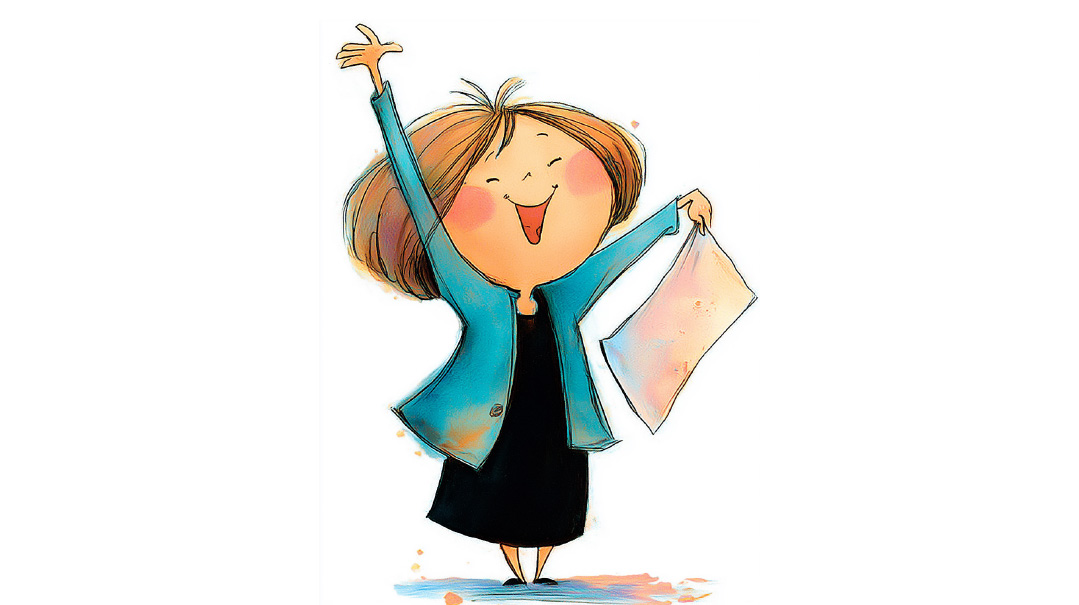Dancing for Daddy

He gives me the longest brachah I have ever received. It will also be the last

Photo: Shutterstock
The melody grows stronger louder. Men march into the room in time with the lively beat. My mother’s closest friends lean in toward me. “Don’t cry” they whisper. “Be strong for your mother.”
I stand on the platform beside my mother, and a great ache fills me. Even as the words of encouragement echo in my ears, the tears well up. I squeeze them back. I plaster a smile on my face, clenching my fists against the soft satin of my gown. Has a tear escaped, falling down my face?
My thoughts churn: Daddy, do you see? Are you with us, now, as your daughter heads to the chuppah?
When my sister got engaged, I wanted to display a picture of Daddy in the dining room, at the l’chaim. I wanted him to be there; I wanted to feel his presence. And I wanted everyone else to notice the photograph, and remember him. My mother had discouraged me, “It will make people uncomfortable.”
Now, here we stand, at the culmination of this emotional engagement. The chassan gently places the veil over my sister’s face. The Rav approaches her, and holding his hands high above her head, gives her a brachah.
My hands are clenched. No! No! I cry soundlessly, Only Daddy!
Footsteps and chatter and swirling color. I hear none of the background noise. The crowds fade away, and I’m drawn into my memories. The scenes flash through my mind at lightning speed, and though I try to draw my mind back to the present, I can’t stop the memories.
It is less than two years ago, and I am the kallah, sitting on a chair cloaked in white. My father approaches me, placing his hands on my head. He gives me the longest brachah I have ever received. It will also be the last.
Now, I’m twirling on the polished parquet, giddy with happiness. Diggi-diggi-da-dum is blaring from the bandstand. The music stops abruptly. No grand finale? Strange, but okay… I proceed to the head table, where I’m informed that someone has collapsed on the men’s side. A few minutes later, I hear that it was my father.
Tremendous commotion; Girls huddle in groups, saying Tehillim, bewildered guests mill about, speculating, and family members rush around. My chassan and I leave the main ballroom and go to the badeken hall. I cry, and together we say Tehillim and my chassan encourages me: “Ein od milvado yisbarach…” A woman comes in every now and then and updates us: “They’re still doing CPR.” “The ambulance has arrived…” Eventually, she informs us that my father has been taken to the hospital.
My new husband and I head back to the main ballroom. A rav tells me that paramedics have succeeded in getting my father to breathe on his own. My mother and brothers have gone along to the hospital; other family members have followed. I’m receiving conflicting reports. To continue the wedding? To finish up quickly?
“Why? Did my father die?!” The party planner, a close family friend, tells me that the rabbanim said the wedding should continue. I go up to the bandstand and tell the musicians to play.
The music starts up slowly, and my mother’s close friends hold my hands. I’m feeling agitated, and ask for my sisters to join me. The tempo picks up, “Hu Yisbarach oseh nissim.” I daven along with the songs. I squeeze my eyes shut and promise myself that when my father gets better, I’ll report to him how I made sure the simchah went on.
The following morning finds me at the funeral home. We are instructed to ask mechilah from our father. What? Daddy’s in this box?! Daddy, who sang and danced and laughed… Who was so alive? I hurriedly whisper my apologies, but I consider it a mere formality. I am so grateful that I received his mechilah the previous day, just moments before my chuppah.
I stand self-consciously at the levayah, in my brand new sheitel. I don’t want to sit down. Pressed against the mechitzah, I want to watch and listen to the speakers, but I can’t focus on their words. I wonder what the crowds are thinking. Do they pity me? Do they pity us? Just the week before, Daddy had told us that he wanted his Rav, his chavrusos, and his sons and sons-in-law to eulogize him when he died. My mother had joked, “And your son-in-law will say...” continuing in a croaking voice, “‘I’ve known my father-in-law for seventy years’!”
But that was not meant to be. Daddy, did your neshamah sense your end was approaching?
My mother, my sisters, and I sit on low chairs. My pre-tied tichel is perched awkwardly on my head, and I wear a torn lavender blouse. A slideshow of the unprofessional wedding pictures plays on the digital frame. Visitors comment on how Daddy looks overjoyed in the photos. He was. My heart is numb, but the tears flow. No, he wasn’t sick. Yes, he was 56 years old. You want to know if he ate at the wedding?!
We tell people that we feel that if Daddy could have chosen a way to die, he would have chosen this way. We are grateful Daddy was able to honor those who were mashpia on him, by giving them kibbudim at the chuppah, and by dancing with them. A people-person, I know he’d be pleased that he died surrounded by family and friends.
He died wearing his trademark smile — b’simchah, which the Gemara tells us is siman yafeh lo. He died performing a mitzvah, bringing joy to a chassan. Radiant and spirited, he had been dancing. He jumped into the air, and just collapsed. My uncle, a physician, who had been holding his hand, said it looked like Daddy died without pain. He hadn’t clutched at his chest or gasped. Onlookers felt it was misas neshikah, that he had been gathered in a heavenly kiss.
My principal comes and tells us that the shushbinin, those who accompany the chassan and kallah to their chuppah, also experience a Yom Kippur on that day. They also have their aveiros forgiven. That’s a comfort. I check my father’s cell phone and see that his last phone call was the fulfillment of a promise: After the chuppah, during the family pictures, he had called a rav who couldn’t attend the wedding, to allow him to participate in the simchah from afar. Daddy would be glad he was able to keep his word. I feel a surge of happiness, even while my eyes fill with tears. My vision blurs, and the room is swimming...
And I’m jolted back to reality. My sister’s wedding. The singing fades away, and the men have all but left the room.
I look into the crowd. Most of these guests were at my wedding. Perhaps they, too, are recalling Daddy’s last moments? Friends and neighbors are sniffling, gracefully dabbing at the corners of their eyes. It seems his absence is noticed.
Someone thrusts a pack of tissues into my hands, which I gratefully accept. I may not be as strong as my mother’s well-meaning friends would like, but I am resilient. And crying is not a contradiction to resilience and strength.
The guests leave to the chuppah, as my mother, my sister, and I huddle together in a side room. Here, we can let our tears fall freely. The wedding coordinator hurries over. The chassan is already standing under the chuppah.
Daddy, I want you to have nachas. I know you want me to be happy. I know you’re beaming so proudly. You must be dancing and jumping Up There. We haven’t forgotten you.
I muster up the courage, shift my thoughts to joy, and join my mother in walking my sister to her chuppah.
May this story be l’iluy nishmas my father, Yoel ben Avraham, z”l.
(Originally featured in Family First, Issue 497)
Oops! We could not locate your form.






